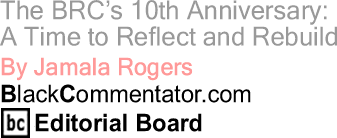
|
||||||||||||||||||||||
 |
||||||||||||||||||||||
 |
||||||||||||||||||||||
 |
||||||||||||||||||||||
 |
||||||||||||||||||||||
 |
||||||||||||||||||||||
 |
| The current issue is always free to everyone |
|
|
 |
The Black Radical Congress is celebrating its 10th Anniversary. For some, itís been a longer journey. Iím not
saying this in a pejorative manner; itís objectively true. The
seed for the concept germinated some two years before the historic
founding in The Black Radical Congress (BRC) was born into a movement of both cynicism and hope. From the very beginning, the naysayers threw their proverbial rocks from the sidelines. There were also the recurrent debates about who was the blackest, the most radical, the truest feminist, etc Thee was the question of control, i.e. who had hegemony in the group. To this day, I still hear that the BRC is dominated by academicians even though for the last several years, only one person from the academy has served on the leadership body. When the dust settled, the hopeful forces prevailed.
Those members went on to build Local Organizing Committees in
more than a dozen major cities, popularized the Education not
Incarceration campaign and engaged in local organizing around
issues affecting the African-American community. Thanks to some
tech-savvy members, the BRC was one of the first black national
groups to utilize the internet as an organizing tool and we
were among some of the original black voices to speak out against
the invasion of
As someone who has been involved in political organizations since I was fourteen, my commitment to building the Black Liberation Movement is enduring. My understanding of the need for the black left to be organized to lead the BLM and to influence the other social movements is unwavering. What is up for debate is the organizational form/s that is/are best equipped to build the objective black united front. If it is not the BRC, what should it be? I am open to dialog with others who are seriously trying to build organizations that build power for people not individuals. As much blood, sweat and tears that have been put into building the BRC, there would be no hesitation or regrets to close the chapter on this entity to embrace another with more potential. What I know from my organizing experiences is
that you ainít gonna talk your way into building such an organization,
let alone a movement. At some point, you have to do some work.
You have to build relationships, you have to build programs
to address the needs of our communities, you have to organize
our people in ways that empower and develop them. The life of the BRC has been no crystal stairs.
Yet, here we are - still standing but knowing that there are
some critical questions we will have to grapple with at this
stage of our development. Key issues, in addition to assessing
the period that we are in and critiquing the BRC, are how do
we fund and sustain an effective organization, what does the
BRC need to look like in order to respond to the current crises
of our people, how do we hold one another accountable in our
movement, can we draw lessons from the Obama campaign, etc.
These and other questions will have central stage at the upcoming
conference on June 20-22 in I encourage you to be a part of re-shaping the BRC so that it is more relevant, more impactful and more inclusive for the next ten years. The deteriorating conditions of our people demand it. For more information on the BRCís 10th Anniversary, visit the website at www.blackradicalcongress.org. It is not too late to add you or your organization to The Call endorsement list or to take out an ad in the souvenir ad book. BlackCommentator.com
Editorial
Board member, Jamala Rogers, is the leader of the Organization for Black Struggle in |
Your comments are always welcome. e-Mail
re-print notice
If you send us an e-Mail message we may publish all or part of it, unless you tell us it is not for publication. You may also request that we withhold your name. Thank you very much for your readership. |
|
| May
29, 2008 Issue 279 |
|
| Executive Editor: Bill Fletcher, Jr. |
| Managing
Editor: |
| Publisher: Peter Gamble |
| Est. April 5, 2002 |
| Printer Friendly Version in resizeable plain text format or pdf format. |
 |
 |
 |
| |
| |























 However,
the road was far from smooth. Divisive issues such as accepting
Ford Foundation monies and being critical of
However,
the road was far from smooth. Divisive issues such as accepting
Ford Foundation monies and being critical of 








